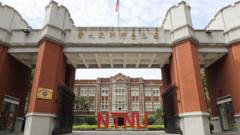A recent investigation has uncovered a disturbing case of lead poisoning involving Peixin Kindergarten in Tianshui, Gansu, China. With evidence of manipulated blood tests and negligence among local officials, this incident has prompted fresh scrutiny of food safety regulations in educational institutions.
Cover-Up Unraveled in Shocking Lead Poisoning Scandal Affecting 200 Children in China

Cover-Up Unraveled in Shocking Lead Poisoning Scandal Affecting 200 Children in China
Authorities reveal a far-reaching cover-up involving officials and hospital staff following the lead poisoning of 235 children at Peixin Kindergarten.
In a shocking revelation, a recent investigation has exposed a major cover-up regarding the lead poisoning of over 200 children at Peixin Kindergarten in Tianshui, Gansu province, China. The inquiry found that numerous local officials and hospital staff attempted to conceal the severity of the case, sparking widespread outrage across the nation.
The troubling episode began when parents reported symptoms among the children after consuming meals made with inedible paint to make the food appear more appealing. Authorities later discovered that food samples contained lead levels exceeding the national safety limit by as much as 2,000 times. An alarming total of 235 children were hospitalized, with 234 of them now released after treatment.
According to the official report, city officials had accepted bribes from an investor linked to Peixin Kindergarten while failing to conduct necessary food safety inspections. Eight individuals were initially detained for their involvement, with significant legal actions following; this includes the arrest of six, including the kindergarten's principal, several cooks, and the investor.
In response to the crisis, investigations revealed systemic failures in the handling of the lead poisoning cases, particularly by the Gansu Provincial Centre for Disease Control and Prevention. The failure to adhere to operating procedures significantly distorted blood test results and stymied timely responses to symptomatic students and staff.
The report prompted a mixed reaction online, with some netizens praising the government's transparent acknowledgment of the scandal while demanding accountability for all responsible parties. Amid the fallout, the central government formed an expert panel to address and reform existing protocols related to food safety in educational settings.
In an effort to prevent future incidents, China has implemented new national guidelines mandating rigorous testing and centralized procurement for school meals. Tianshui officials have also announced free treatment and legal support for families affected by the poisoning crisis, and Peixin Kindergarten will temporarily operate under state supervision.


















